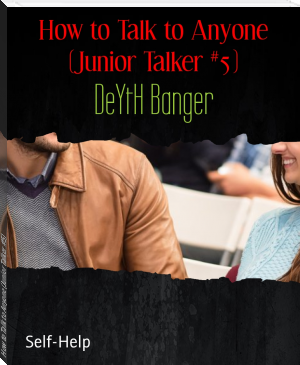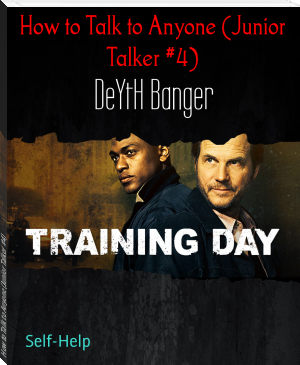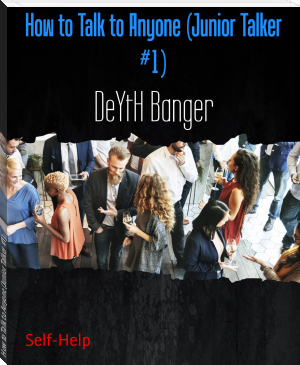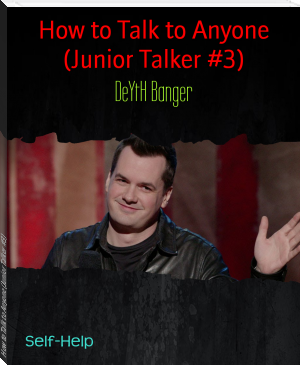How to Talk to Anyone (Junior Talker #5) by DeYtH Banger (old books to read .TXT) 📕

- Author: DeYtH Banger
Book online «How to Talk to Anyone (Junior Talker #5) by DeYtH Banger (old books to read .TXT) 📕». Author DeYtH Banger
A previous study by Brummelman, Bushman and several colleagues showed just how much some parents overvalue their children.
In this study, parents were presented with topics that their eight to 12-year-old children should be familiar with, such as the astronaut “Neil Armstrong” and the book “Animal Farm.” The parents were asked how familiar they believed their children were with those items.
But the researchers also included items that did not exist, such as “Queen Alberta” and “The Tale of Benson Bunny.”
“Overvaluing parents tended to claim that their child had knowledge of many different topics — even these nonexistent ones,” Brummelman said.
But the researchers noted that parental overvaluation is not the only cause of narcissism in children. Like other personality traits, it is partly the result of genetics and the temperamental traits of the children themselves.
“Some children may be more likely than others to become narcissistic when their parents overvalue them,” Bushman said.
Bushman, who is a father of three children, said his research on narcissism “has changed my parenting style.”
“When I first started doing this research in the 1990s, I used to think my children should be treated like they were extra-special. I’m careful not to do that now,” he said.
“It is important to express warmth to your children because that may promote self-esteem, but overvaluing them may promote higher narcissism.”
Brummelman said these results suggest a practical way to help parents.
“Parent training interventions can, for example, teach parents to express affection and appreciation toward children without telling children that they are superior to others or entitled to privileges,” he said.
“Future studies should test whether this can work.”
Obsessive Thoughts: Watching My Garden Grow
By Dave Mowry
The lucky among us recognize obsessive behavior early. Many of us, however, get stuck in the obsessive brain. We know that something is not right, but rational thought seems to be pushed aside.
Obsessive thoughts and behavior can come with balanced mood, but especially with hypomania and mania. We have energy to do things, and this one thing we are doing makes us feel good. Since it feels good we want to do more of it. Soon we are thinking of nothing else. Normal daily activities get left by the wayside.
From here it is not pretty. We think about this one thing when we go to bed. Obsessing keeps us from falling asleep. We wake up tired in the morning—and still thinking about our obsession. We know there are other things that need to be done at home, at work, and with friends and family. We try to think about these things. But our minds keep going back to the obsession.
This happened to me this spring with gardening. I was gardening and enjoying it. Then it was all I was thinking about and all I was doing.
I know I am obsessing when I keep having the same thoughts over and over again. I will go from one thing to another and then come full circle. I will do this over and over, circling through the same ideas because I want to keep gardening (or what- ever I’m obsessing over) even though on a practical level, there is nothing left to do.
Here’s what it looks like when I obsess:
I find myself just sitting looking at the plants in my garden for long stretches. I see a stem that needs trimming and do that. Then I look for more stems that need trimming. Then I check whether any- thing needs watering—for the fourth time.
I am looking at plants for the 10th time today. At this point, the obsession doesn’t feel good.
I am being pulled to stay there. So I sit. I try to distract myself. I go inside and pick up that book I started reading six months earlier. I can’t concentrate. My mind drifts back to the garden. I am drawn to it again.
I like watching basketball on TV. Usually I have no problem sitting down to watch a game. And when the game comes on, I am into it. At least, until the commercial break. Then my mind goes back to the garden. At half-time I am back out in the garden. I am looking at plants for the 10th time today.
At this point, the obsession doesn’t feel good. It feels like a flaw. I feel guilty for the other things I’m neglecting. But still, I don’t do those things. It feels impossible to switch tracks.
Then comes a day when I have a writing deadline. I set my alarm with two reminders. The first reminder goes off. I’m staring at plants. I know I’m wasting time, but I can’t stop. After the second reminder, I push myself to get started.
By writing I am accomplishing something. It feels good. But I still have that gnawing, negative feeling in the pit of my stomach. As I work, I wonder what will happen when I am done. Will I be drawn back to the garden, or will I put in that load of laundry that I have been putting off for three days?
I know I need to do more than watch plants grow. I know I will feel guilty if I continue to ignore important parts of my life for the sake of an obsession. I’m good at feeling guilty. I have lots of experience with it.
But for all the guilt, there is good news: I have the best garden in town, and my neighbors never run out of tomatoes.
Bipolar Disorder, The Urge to Overshare, and Avoiding Rejection
While sharing your experiences is a great way to break the stigma of mental health conditions, it’s important to remember some people may become overwhelmed.
For most of us, it is beneficial to talk about our bipolar disorder with close family, peers, with friends, and with counselors and doctors. But for many people, the urge to overshare at the wrong time and place leads to a bad experience, rejection and isolation.
Many of the comments to my past posts have been from people who live with bipolar disorder and find themselves at a social or family function. When someone comes up and says,”Hi, how are you doing? What’s going on with you?” instead of talking about the latest book we have read or a recent movie or what they have been up to, we start talking about our meds, our latest trip to the hospital, and our government’s poor policies on mental health.
Unfortunately, we don’t know the person we are talking to very well, and they don’t know our past history. All of a sudden, they are overwhelmed with too much information and with our intensity.
This is a good way to bring people down and leave them with nothing to say. They get uncomfortable and soon they excuse themselves and leave us standing there alone, feeling rejected. We end up leaning against a wall or hiding in the corner counting the minutes until we can quietly escape and go home where it is safe.
Our bipolar disorder is often a main part of our lives. We live it every day and it takes most of our time and energy. We are born advocates for breaking stigma and converting people to see mental health conditions in a different light. Too often it comes across as too much information and us making a hard sell.
I think we have all been in a situation, at a social function, where someone pins us in a corner and drones on about something we don’t particularly care about.
As mental health advocates, we think we need to self-disclose and educate everyone we talk to. Again, there is a time and a place for this.
At the end of the social function, we go home flustered and alone. We wonder if we will ever be able to go to a social function and be able to fit in and be someone other people find interesting.
The answer is yes, we can.
Is Bipolar Disorder’s Obsessive Thinking and Behavior Affecting Your Life?
Bipolar disorder is recognized by mania, depression and usually anxiety. One area of bipolar not usually talked about is obsessive thoughts and behavior.
The lucky ones recognize obsessive behavior early and identify what it is that makes us obsessive. Most of us, however, get stuck in obsessive brains. We know that something is not right but we don’t know what. Rational thought seems to be pushed aside.
The obsession comes with balance and/or mania or hypomania. We have energy and are doing things. Hopefully we are accomplishing things that need to be done. But then there is trouble.
One thing we are doing makes us feel good at first. Since it feels good we want to do more of it. Soon we are thinking of nothing else. Our normal daily activities get left by the wayside and soon all we are thinking about is the one thing we want to do.
From here it is not pretty. We think about it when we go to bed. Obsessing about it at night keeps us from falling asleep. We wake up tired and thinking about our obsession in the morning. We know there are other things that need to be done at home, at work and with friends and family. We try to think about these things. But our minds keep going back to the obsession.
This is happening to me now. I recently started gardening. I enjoy it until it is all I am thinking about and all that I am doing.
This is the toughest blog I have written. I usually look forward to writing and sharing my experiences with you. But today my mind is in another place.
I know I am obsessing in the garden when I keep having the same thoughts over and over again. I will go from one thing to another and then come full circle. I will do this over and over because I want to keep “gardening” even though there is nothing left to do.
I find myself just sitting looking at the plants for a long while. Then I see a stem that needs trimmed and I do it. Then I look for more stems. Then I check the water for the fourth time. I am being pulled to stay there. So I sit.
This is the toughest blog I have written. I usually look forward to writing and sharing my experiences with you. But today my mind is in another place.
I try to distract myself and pick up that book that I started reading six months ago and am only on chapter 3. However I can’t concentrate. My mind drifts back to the garden and I am drawn to it again.
I like watching basketball on TV. Usually I have no problem sitting down to watch a game. After the game starts I am into it—until the first time out and commercial. Then my mind goes back to the garden. It is not that I have to do something specific. It is just that I can’t stop thinking about it.
At this point the obsession doesn’t feel good. It feels like a flaw and I feel guilty for the things I have neglected.
But still I can’t do these things. At half time of the game I am back in the garden. I am looking at plants for the tenth time today.
Today is my blog day so I set my alarm with two reminders. I wanted to ignore them and keep staring at plants. I knew I was wasting my time but I could not stop. After the second reminder I knew that I needed to start the blog in order to meet my deadline.
By writing I am accomplishing something. It feels good but I still have that gnawing negative feeling in the pit of my stomach. I wonder what will happen when I am done. Will I be drawn back to the garden or will I put in that load of laundry that I have been putting off for three days?
I know I need to do more than watch plants grow. I know I will feel guilty if I continue to ignore important





Comments (0)